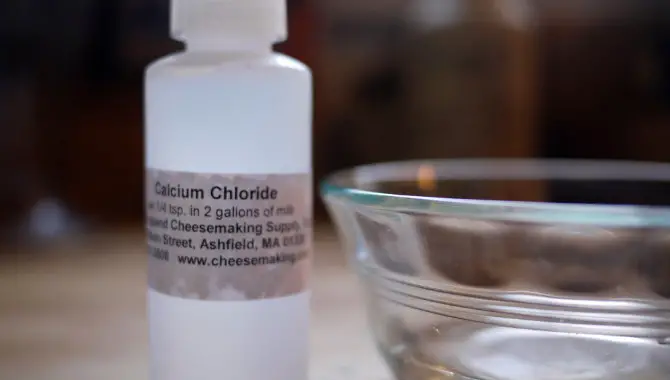One commonly used ingredient in food production is calcium chloride. It’s used as an additive to firm and coagulate a wide variety of foods, including soft drinks, canned food, and in tofu production, as well as in food processing, just to name a few. Calcium chloride can also be used for industrial purposes like deicing roads. The basic concept of veganism is about avoiding animal products or by-products. Some ingredients are, however, trickier to spot, especially when used as fillers or additives in processed foods. For this reason, when following a vegan diet, it’s important to be aware of other ingredients that may be lurking in otherwise vegan-friendly food products.
Is calcium chloride vegan? The answer is simple, yes! Calcium chloride is produced in two ways: purifying naturally occurring brines and from a chemical reaction involving limestone. The former is the most widely used method. Regardless of the method used, there’s no animal product or by-product in calcium chloride, making it vegan by all means. That’s why this ingredient is popularly used as a firming agent in many vegan products.
While some people choose to adopt a vegan lifestyle for health purposes, others do it to be kinder to animals and/or the environment. Then there’s another group that does it simply because it’s a growing trend that has received backing from many celebrities. Whatever your reasons are, I must commend you for going vegan as it’s the right step towards a better future. That being said, there’s no specific guideline for veganism; people can draw their own lines as to what they will or won’t eat. In this article, I’m going to explain more about calcium chloride, including what it is, how it’s made, whether it’s healthy and safe for vegan consumption, and much more. The goal here is to educate you as a vegan so you can make an informed decision about this ingredient. Let’s get started:
Is Calcium Chloride Vegan?
As mentioned earlier, it’s made from limestone (a stone that’s vegan) via a chemical reaction. It can also be made by purifying brine, which is the most commonly used method. As you can see, there’s no mention of animal product or by-product, which makes it vegan-friendly by the basic definition of veganism.
To help answer this question further, let’s go back to the beginning. People adopt a vegan lifestyle for different reasons. This part of the text will shed some light on whether calcium chloride is good for different kinds of vegans. But first:
What is calcium chloride?
Simply put, it’s a type of salt that often functions as a food additive. This chemical is hygroscopic, which means it has the ability to attract and absorb water molecules from its surrounding. This property allows it to be a firming agent in food.
What Is It Used For?
Calcium chloride is used in a wide range of industries, including construction, automotive, mining, medicine, food (which is our main focus for today), and so on. Food grade calcium chloride has several uses in the food and beverage industry. For starters, it’s used in the pre-harvest crop treatments to eradicate potential decal. Secondly, it’s used in post-harvest treatments where it’s sprayed on fruits and vegetables to enhance firmness, increase freshness, and as an anti-browning agent. Increased firmness helps to prevent breakup during processing and cooking.
Calcium chloride can also be used in salt processing applications to add a salty taste to pickles and other food items without increasing sodium content. The levels of nutritional calcium can be enhanced in frozen fruits and vegetables by processing them with calcium chloride. Generally, this ingredient helps to extend the shelf life of various foods while maintaining the desired texture and flavour properties.
Additionally, it’s used to correct mineral levels and pH of the water used in beer and soft drinks industries to ensure uniform taste.
Last, but not least, calcium chloride may also be used in applications where small amounts of sodium and potassium are required, so long as it doesn’t interfere with the intended use of calcium chloride or affect the end product.
To help simplify all this, here are some common vegan foods that usually contain calcium chloride so you know where to look:
- Pickles
- Tofu
- Soft drinks
- Canned beans
- Confections
- Sports drinks
- Canned fruits
- Canned vegetables
What Should Vegans Watch Out For In Calcium Chloride?
Up to this point, there’s nothing in calcium chloride suggesting that it contains any animal product or by-product. By most people’s standards, calcium chloride is vegan-friendly. However, there are different kinds of vegans with some being too strict than others. Such vegans go an extra mile to look into the production of an ingredient before declaring it vegan. That’s because they refuse to be associated with any product that causes animal suffering even through affiliation. Here are a few issues with calcium chloride that may be of vegan concern:
- Limestone
Some vegans don’t think limestone is vegan-friendly since it’s made from decomposed plants and animals. Such vegans may choose to avoid calcium chloride that’s made from limestone. The problem is it’s hard to avoid this ingredient completely given that it’s a common ingredient in most foods. Calcium chloride is one of the best ingredients for coagulating and firming food, not to mention it’s also considered an essential source of mineral balance in beverages. In my opinion, this isn’t enough reason to avoid calcium chloride. That’s because limestone is composed of the calcareous remains of plants and animals that have been dead for millions of years. There is no animal exploitation involved in making use of fossilised remains. Everything on this planet is intertwined. Avoiding calcium chloride on this basis would mean you also avoid fruits because bees pollinate them or vegetables because they grow with the help of worms bugs. What’s important is to avoid foods that involve the deliberate harming of animals. But then again, it’s your decision to make!
- Animal testing
Food grade calcium chloride is produced under strict supervision to ensure high levels of purity and consistency. Given that studies related to this ingredient’s effects on humans are lacking, its safety and potential effectiveness are quite questionable. There are only studies about its potential effect on the growth and development of certain animals. You see why some vegans may have a problem with consuming calcium chloride.
Is Calcium Chloride Healthy
I’ve covered how calcium chloride may be of concern to vegans who want to be kinder to animals, what about those who are in it for health purposes? There are plentiful uses of calcium chloride in food applications, which makes one wonder whether it’s safe for consumption or not. Let’s see the health benefits, as well as risks so you can decide whether it’s worth consuming:
Health benefits of calcium chloride
As far as food additives go, this ingredient provides you with several health benefits. This is especially true in sports drinks where it acts as one of the electrolytes to help maintain body fluid balance throughout activities, as well as maintaining proper nerve and muscle functions. Additionally, calcium chloride in sports drinks helps to prevent muscle spasms, maintain bone health, and keep your heartbeat regular.
Health risks
Calcium chloride found in food products poses minimal threat to humans as it’s generally regarded as safe for human consumption. But, like most food additives, using in moderation is important. If used in place of salt, care must be taken. Ingesting large amounts can cause nausea, burning inside the mouth and throat, vomiting, as well as increase blood pressure. The hygroscopic properties of this ingredient also mean that excessive consumption could lead to extreme thirst, severe dehydration, and abdominal pain. Keep in mind that some people are allergic to calcium chloride and calcium supplements. Therefore, if you have an adverse reaction when consuming this ingredient, consult a physician.
In Conclusion: Should Vegans Consume Calcium Chloride?
Calcium chloride is a natural mineral derived from limestone queries of by purifying brine. As a food ingredient and additive, it has no relation to animal products, which makes it vegan-friendly. Some non-vegan foods contain calcium chloride, but even then, it not the problem ingredient.
While it might be 100% vegan by most people’s definition, some vegans are concerned that the limestone used to make calcium chloride may not be vegan. In my opinion, this argument does not hold water. After all, everything is part of everything in the ecosystem. The most important part of being vegan is to avoid products whose production involves deliberate harming of animals.
Keep in mind that calcium chloride should be taken in moderation. Just because a food product is vegan doesn’t necessarily make it healthy –this is one of those instances.
Despite it being vegan-friendly, there are certain groups of people who should refrain from consuming calcium chloride because it may lead to other health problems. This includes:
- Those who are allergic to calcium or calcium chloride
- Those with breathing problems
- If you’re taking certain drugs such as ceftriaxone, doxycycline, minocycline, eltrombopag, oxytetracycline, digoxin, and lymecycline. That’s because these drugs interact with calcium chloride.
This list is inconclusive so consult with your physician before consuming this product.
I hope this article was able to give you a few insights about calcium chloride that will help you make the right decision about whether or not to include it in your vegan diet. The good thing about veganism is it has no specific set of rules. You create your own! However little the changes might be, it’s a good step towards creating a healthier lifestyle and a better environment.
Welcome to VeganClue - My name is Robert Van De Ville and together with my team we spent hundreds of hours researching the most relevant topics for Vegans and non yet Vegans. Are you looking for more information about Veganism, animal welfare, diet, health, and environmental benefits of the Vegan lifestyle? You are in the right place! Enjoy the site.


